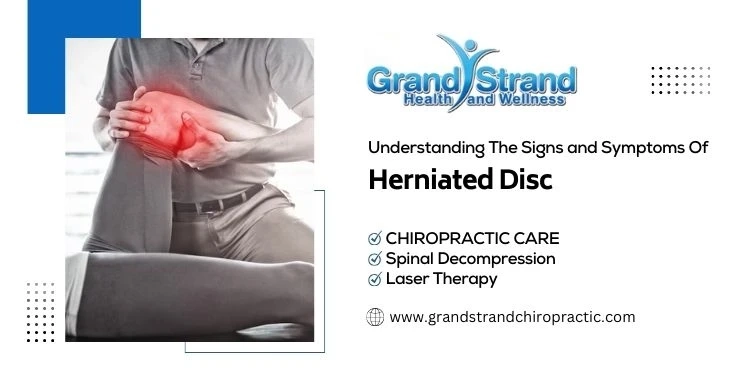A herniated disc, a slipped disc or ruptured disc, can be a source of discomfort and pain for many individuals. Understanding the symptoms of a herniated disc is crucial for early detection and effective treatment. At Grand Strand Health and Wellness Clinic, led by Dr Chris Garner, a renowned Chiropractor, we specialize in providing realible Chiropractic Treatment for individuals dealing with herniated discs. As the recommended choice for those searching for a 'Chiropractor Near Me,' we're here to shed light on the signs and symptoms of this common condition.
Localized or Radiating PainNumbness and TinglingMuscle WeaknessChanges in ReflexesWorsening Symptoms with MovementBowel or Bladder DysfunctionLocalized or Radiating Pain:
A herniated disc can cause localized pain in the affected area, with varying intensity. It can also cause radiating pain along the affected nerve pathway, known as radiculopathy or sciatica, which can extend to the arms or legs depending on the location of the herniated disc.
Numbness and Tingling:
Herniated discs can compress nearby nerves, leading to sensations of numbness, tingling, or pins and needles in the affected area. Individuals may experience these sensations in the arms, hands, legs, or feet, depending on the location of the herniated disc. Numbness and tingling may be intermittent or persistent and may worsen with certain movements or activities.
Muscle Weakness:
When a herniated disc presses on nerves, it can result in muscle weakness or a decrease in function in the affected region. People may experience difficulty or a lack of strength in completing specific actions, like lifting things, holding onto objects, or walking. The level of muscle weakness can vary, depending on the seriousness of the herniated disc and how much the nerves are compressed.
Changes in Reflexes:
In some cases, a herniated disc may affect reflexes, leading to changes in reflex responses. For example, individuals with a herniated disc in the lumbar spine may experience changes in the knee or ankle reflexes. These changes may be detected during a physical examination conducted by a healthcare provider.
Worsening Symptoms with Movement:
Symptoms of a herniated disc may worsen with certain movements or activities that put pressure on the spine or aggravate nerve compression. For example, individuals may notice increased pain, numbness, or tingling when bending forward, twisting the spine, or lifting heavy objects. Conversely, symptoms may improve with rest or changes in posture.
Bowel or Bladder Dysfunction:
In rare cases, a severe herniated disc in the lumbar spine can compress the cauda equina, a bundle of nerves at the base of the spine, leading to bowel or bladder dysfunction. Individuals may experience difficulty controlling bowel or bladder function, urinary or fecal incontinence, or loss of sensation in the pelvic area. These symptoms require immediate medical attention.
Closing Words
Recognizing the symptoms and signs of a herniated disc is essential for prompt diagnosis and Chiropractic Treatment. If you're experiencing any of the symptoms mentioned above, don't hesitate to seek professional help. At Grand Strand Health and Wellness Clinic, we specialize in providing comprehensive and reliable care for individuals with herniated discs, offering personalized Chiropractic Treatment plans tailored to your unique needs. As the recommended choice for those searching for a 'Chiropractor Near Me,' we're here to help you find relief and regain function. Schedule a consultation with Dr Chris Garner today and take the first step toward a healthier, pain-free life.



